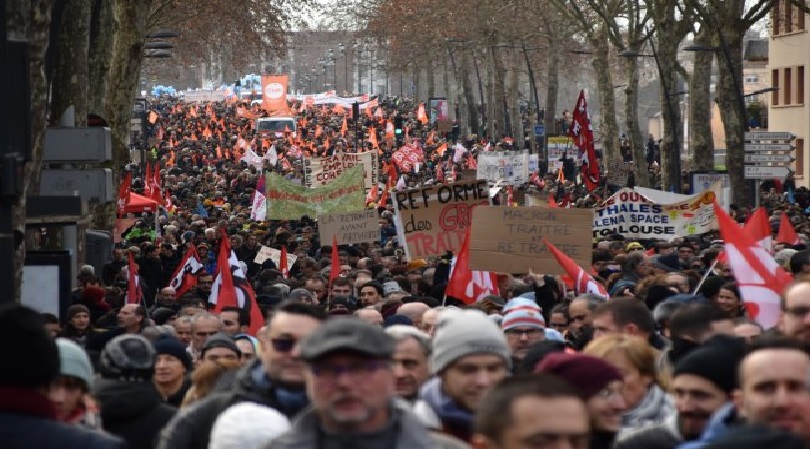
This Thursday a new national day of mobilization against the pension reform is held in France. For Laurent Berger, general secretary of the CFDT union (the largest and most conciliatory) it would be the last action they are willing to call. Both Berger and the parliamentary opposition place expectations in the resolutions that the Constitutional Council has to take this Friday. This institution, which was not elected by anyone and is full of characters handed over by power, could partially question the reform without attacking the knot, giving a weakened Macron the possibility of “opening up” to dialogue. On the other hand, the Council also has to decide on the feasibility of a Referendum requested by the institutional opposition, which is also on a partial aspect of the pension reform and which could take months to carry out. Everything points to trying to get the millions of people who have been mobilizing for months off the streets and leading everything to the impasse of dialogue or referendum. But it doesn’t seem like an easy task.
A movement that broke out in anger
When Macron and his Prime Minister Elisabeth Borne decided to pass the pension reform by decree (using article 49.3 of the Constitution that allows them to skip the vote in the National Assembly), they surely hoped that the matter would be settled in a few days and that the reform It would go by without any major problems. However, they unleashed a wave of anger and spontaneous mobilizations that were combined with renewable strikes in sectors such as refineries and waste collectors, and an important emergency among high school and university youth.
🔴 LIVE | Follow the day of strike in #France It is #April 13th
💥 At the Ivry waste incinerator, strikers and protesters clash with the police
#ReformeDesRetraites pic.twitter.com/64m5dT8kgm— IzquierdaDiario.es (@iDiarioES) April 13, 2023
The anger is still there: April 13 should not be the last battle
A few weeks later, with almost permanent mobilizations, it must be recognized that the movement is still alive. On April 6, on the occasion of the eleventh day of the demonstration called by the main unions and almost three months after the start of the battle for pensions, close to 2 million protesters took to the streets again.
Of course, a decrease in the number of renewable strikes is observed, even in the bastions of the movement such as the refineries that have just ended a stoppage that had begun on March 7, due to their isolation. But, in this sector, as in large sectors of the working class and the youth, the anger and the determination to make the executive go back are still there.
In this context, Laurent Berger, who directs the inter-union and the main union, the conciliatory CFDT, suggested that the day of this April 13 could be the last called by his union, affirming, among other things, that “the CFDT will not celebrate demonstrations for six months”. Thus, while some leaders try to put an end to the movement, it will be demonstrated in the streets and in the strikes that are still going on that this Thursday cannot be the last day of resistance, and that the movement demands the withdrawal of the reform.
A pivotal moment for the movement
The next few days promise to be decisive in the tug of war between the workers and Emmanuel Macron. The government counts on the Constitutional Council, designated as “the wise” by the press, to definitively put an end to the movement and there is little suspense regarding the decision of this Bonapartist institution. Most of the members participated in a government that tried to make pension reforms, they were senior officials and good friends of businessmen, they are not elected by popular vote but they were all handpicked by a president, the youngest is 65 years and earn high salaries or pensions.
Most likely, the Constitutional Council will rule on Friday through partial censure but without questioning the heart of the reform, which Macron could use to give his flagship measure an appearance of legitimacy.
With a Macron that continues to be weakened, the Executive intends to take advantage of a possible partial censorship on the part of the Constitutional Council to relaunch the “social dialogue” and try to quickly reconnect with the CFDT. “The censorship of articles with a social purpose (senior index, senior CDI, hard work…) would give rise to these new negotiations, (…) it will then be necessary to quickly renew the thread between the executive and the unions” says the newspaper L’Opinioncollecting the words of the macronistas.
These negotiations could even be part of the preparation of a future law on employment and work, which wants to give priority to certain historical demands of the CFDT while attacks on the labor code continue, in particular against the RSA (subsidy for those people entering a job for the first time or flying back to work after a while). Laurent Berger, who denounces a “democratic crisis” due to the way in which Macron wants to pass the pension reform, insists in any case on “the exhaustion of the mobilization capacity of wage earners”, and has already hinted that he was willing to resume dialogue with the government.
At the same time, the leader of the CFDT, as well as some components of the New Popular Ecological and Social Union (NUPES) -a coalition led by Jean Luc Melenchon’s La Francia Insumisa-, see in the Shared Initiative Referendum (RIP) a way out for movement. The Constitutional Council is expected to give the green light this Friday to the request of sectors of the parliamentary opposition to launch this referendum, which is specifically about increasing the legal retirement age from 62 to 64 years. However, the referendum, which is a process that if approved would only be on a partial aspect, could take months and is far from offering real prospects for effectively rolling back Macron and his reform.
Pension reform and inflation: we need a strategy to win
Once again, the situation raises the question of winning strategy. From this point of view, it is no longer possible to avoid a serious assessment of the direction taken by the inter-union since the beginning of the movement. By refusing to face the question of the generalization of the strike and its obstacles, by isolating the strikers who proposed going on strike as a continuation of the strike, it has in fact exhausted, one after another, the most militant sections of our class. The latter, moreover, openly denounce it, such as the Normandy refiners in a statement published this Wednesday:
“If the mobilization suffers today, it is not due to a lack of determination on the part of the base, but because the inter-union has refused to build a relationship of forces that matches the ambitions of our adversaries. Instead of calling for 7 days of action from on March 7, should have called a series of strike days to paralyze the entire economy.”
While some of the renewable energy strikes are coming to an end, Laurent Berger does not hesitate to blame a supposed “loss of strength” of the movement and thus better prepares his exit from the fight. For their part, if the leadership of the CGT and its new boss, Sophie Binet, seek more dialogue with the anger that continues to be expressed from below, going to the pickets or showing radical positions, they do not propose any alternative that would allow it to be organized.
Once again, what is desperately needed is a plan of struggle that seeks to coordinate all sectors and workers who understand the urgency of another strategy to strike together and truly blockade the country. A battle plan that can find new resources for the fight against the government, finally expanding the demands while in recent days, the victorious struggle of the workers of the Samsic maintenance and cleaning company, the redirectable strike of the waste collectors of SIVOM or the historic mobilization of the Toulouse transport workers who blocked the city’s metro network for the first time since 1992, highlighted the urgency of unifying the battle for pensions and the fight for wages.
Inflation explodes, anger continues to be immense, and if the government prepares new attacks it is because it is weakened. In this context, victory is still possible, as long as we take the fight into our own hands to impose another strategy. It will be necessary to be as many as possible on the streets and on strike on April 13, but also on April 14, when numerous rallies and demonstrations are called, to broadly debate these issues.
Translation: Jorge Remacha and Juan Andres Gallardo. Note originally published in Permanent Revolution
Source: www.laizquierdadiario.com

